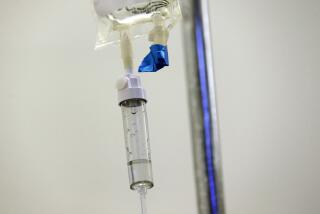Diabetes Drug Rezulin Pulled Off the Market
- Share via
WASHINGTON — The Food and Drug Administration said Tuesday that the popular diabetes pill Rezulin--a drug that won “fast-track” government approval but was linked to scores of liver failures and deaths--will be withdrawn promptly from the U.S. market.
Compared to alternative diabetes treatments, “continued use of Rezulin now poses an unacceptable risk to patients,” said Dr. Janet Woodcock, director of the FDA’s drug evaluation center.
The end for Rezulin, a Wall Street blockbuster that generated more than $1.8 billion in sales and was promoted as free of serious side effects, came Tuesday evening when Woodcock telephoned representatives of the drug’s manufacturer, New Jersey-based Warner-Lambert Co.
“FDA today asked the manufacturer of Rezulin . . . to remove the product from the market,” the agency said in a prepared statement. “The drug’s manufacturer . . . has agreed to FDA’s request.”
The action came 29 months after the first acknowledged death of a Rezulin patient in October 1997. The FDA has concluded that Rezulin use has “possibly or probably” resulted in 90 liver failures, including 63 deaths and seven nonfatal organ transplants.
About 300,000 Rezulin prescriptions are sold each month.
“Patients taking Rezulin should consult with their physicians as soon as possible to discuss alternative therapies,” Warner-Lambert said late Tuesday. “Warner-Lambert will work closely with the Food and Drug Administration . . . to assure a safe and efficient transition for patients.”
Rezulin becomes the eighth prescription drug to be withdrawn from the U.S. market in the last 2 1/2 years. Among the recent withdrawals were Pondimin and Redux, ingredients in the “fen-phen” weight-reduction cocktail, found to cause heart and lung maladies, and Duract, a nonaddictive painkiller that the FDA associated with four liver-failure deaths.
More Toxic Than Two Other Drugs
The FDA noted that Rezulin is more toxic to the liver than two other similar drugs, Avandia and Actos, that also lower blood-sugar levels for adult-onset diabetics.
The drugs, approved in the last year, “offer the same benefits as Rezulin without the same risk,” the FDA said. Added Woodcock: “We are now confident that patients have safer alternatives.”
The FDA sought the withdrawal of Rezulin within two hours of a meeting that included agency physicians, lawyers and other specialists. According to people familiar with the private session, Dr. David J. Graham, the FDA’s senior epidemiologist, said he estimated that 20 Rezulin patients a month are suffering liver failure.
Graham compared Rezulin’s tendency to cause fatal liver failure with the worst side effects associated with the other diabetes drugs. He concluded that Rezulin, by far, is the most dangerous. Graham was one of at least five FDA physicians who challenged top agency officials, beginning at a staff meeting on Jan. 6, by saying that Rezulin’s risks outweighed its benefits and that it should be withdrawn.
The removal of Rezulin comes after Warner-Lambert and senior FDA officials had supported its continued use in the face of mounting deaths and recent repudiation of the pill by numerous health insurers and hospitals.
On four occasions after Rezulin was made available for sale in March 1997, the FDA and Warner-Lambert agreed to safety changes in the drug’s labeling, instead of pulling the pill off the market.
The FDA’s stance stood in stark contrast to that of its counterpart in Britain, the Medicines Control Agency, which oversaw another company’s voluntary withdrawal of Rezulin in December 1997. Citing safety concerns, the British authority refused to allow the reintroduction of Rezulin in March 1999.
But within a week, officials at the FDA, on March 26, 1999, convened an advisory committee meeting, dominated by supporters of Rezulin, including paid consultants to Warner-Lambert. At the conclusion of the meeting, Woodcock indicated in an interview that she did not share the concern voiced by Graham, the senior agency epidemiologist, who presented a chilling picture of Rezulin’s danger.
Graham told the committee that Rezulin was one of the most dangerous prescription drugs on the market, that every patient taking the pill was at risk of liver failure and that there was no reliable way to safeguard them. This flew in the face of repeated assurances from Warner-Lambert and others at the FDA, who said that patients would be adequately protected by monthly blood tests, intended to monitor their liver functions.
In June 1999, the FDA announced that it would follow the advisory committee’s advice and keep Rezulin on the market. In fact, while the FDA said that Rezulin should no longer be used as a stand-alone diabetes treatment, the agency endorsed its expanded use, in “triple combination” with two other diabetes pills.
The FDA’s reassessment of Rezulin’s safety was in direct response to a December 1998 investigative series by The Times and subsequent articles published by the newspaper focusing on deaths related to the drug and the actions of the agency and Warner-Lambert.
The Times reported that the FDA ignored explicit signs of danger while examining Rezulin in January 1997, after a six-month review, the fastest approval granted a diabetes pill.
Complaints About Intemperate Language
The FDA approved Rezulin despite a recommendation to reject the drug by a veteran agency medical officer, Dr. John L. Gueriguian, who cited its potential danger to the liver and the heart. Woodcock’s deputy, Dr. Murray Lumpkin, stripped Gueriguian of his role in reviewing Rezulin in the fall of 1996, following complaints from Warner-Lambert about his use of intemperate language.
Reached Tuesday night at his home in Rockville, Md., Gueriguian said he was pleased to hear of Rezulin’s withdrawal.
“It is the right thing to do. But it is too late. Too many people have already died and suffered.”
Gueriguian stood alone when he opposed Rezulin in 1996. No fewer than four other FDA physicians who examined the drug endorsed its approval. They were persuaded, they said in hindsight, by Warner-Lambert’s claims of safety and the pill’s supposed breakthrough effectiveness.
Indeed, as recently as Feb. 24, Woodcock told reporters in a prepared statement that Rezulin “provides an effective treatment to control blood glucose and in many patients it has proven to be very effective despite the failure of other therapies.”
At least three federal investigations related to Rezulin have been initiated: an inspector general’s inquiry into a senior National Institutes of Health physician’s acceptance of consulting fees from Warner-Lambert, an FDA inquiry into allegations that the company omitted findings of liver toxicity from a 1994 clinical trial and an FDA internal-affairs investigation into how certain agency e-mails came into the possession of The Times.
Company’s Troubles Are Not Over
Having failed to hold support for Rezulin at the FDA, Warner-Lambert on Tuesday night issued this statement:
“The company has always believed that it is essential for patients and physicians to receive accurate and objective information regarding the benefits and risks of Rezulin. . . . However, repeated media reports sensationalizing the risks associated with Rezulin therapy have created an environment in which patients and physicians are simply unable to make well-informed decisions regarding the safety and efficacy of Rezulin.”
The withdrawal, however, will not end the company’s troubles. Over the last year, product-liability cases have been filed in state and federal courts on behalf of patients or their survivors.
One of them, Ismael “Milo” Valenzuela, whose wife, Rosa Delia Valenzuela, died in Los Angeles on Dec. 18, 1998, of liver failure after taking Rezulin, welcomed news of the withdrawal.
“That’s the main thing I wanted to see, to get those pills off the market,” said Valenzuela, a retired jockey who twice won the Kentucky Derby. “They killed my wife--that’s the way I feel about it.”
*
Times researcher Janet Lundblad in Los Angeles contributed to this story.
A series of investigative reports on Rezulin is on The Times’ Web site:
https://www.latimes.com/rezulin







